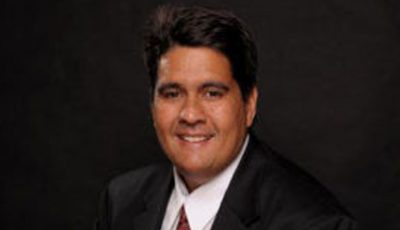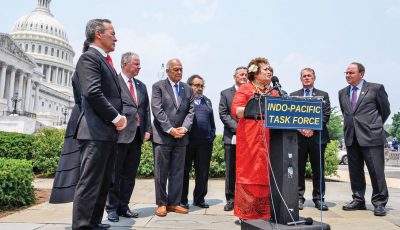By your leave
The late Ruth Tighe wondered if one of our readers understood satire and sarcasm after an article I wrote got a mean-spirited response. A reader suggested that I pen a profile, on the off chance that I might earn extra elbowroom from those who find my prose arrogantly pretentious or ignorantly obtuse. I will use the four categories of time, space, role, and story common in my narratives.
I do so on the occasion of China’s national week, a seven-day holiday, one of two (Lunar New Year is the other) when the nation travels to visit family. Oct. 1 is observed as the day Mao Zedong declared the People’s Republic of China 65 years ago. The nationalists in Taiwan’s Republic of China commemorate the 1911 rebellion that led to the end of the Qing Dynasty and the establishment of the Republic of China in 1912, referred to as the Double Ten. It also honors Sun Yat Sen, revered on both sides of the Straits, better known as Sun Zhongshan.
Now, by your leave. Time-wise, I traveled the imaginal journey of the Book. My Genesis to Apocalypse, however, shifted to the scientific journey of a 14.3-billion-year-old universe. Born under the Protestant Church’s steeple in time for Vatican II’s oikoumene, I learned to love historical memory from Abraham to Moses, the exile and Iesu, Paul of Tarsus to Augustine, (a big hole on Muhammad), Aquinas to Kierkegaard, finally to Bultmann, Tillich, Bonheoffer and Merkel, the Niebuhrs, Argentine Francis, demonized Putin and Petro Poroshenko of Ukraine. Mystics came later.
I descended from the primates of Borneo, if the NY Times is to be believed in earlier suggested cartoons when the U.S. was deciding whether to bring Spain’s Filipinas into the Union, but the human journey has only been the last 30 minutes on a 24-hour journey chart of the planet Earth and the human brain does wonders in imagining the nature of that journey.
Space-wise, I was born in agrarian Central Luzon. On a ship to the U.S. just turned 20, I already traversed the distance from Aparri to Sarangani. I had been to all political units of the U.S. save Vermont and Puerto Rico. After the earthrise picture in ‘68, I became a global citizen. I’ve only seen the Russian Far East in Heihe across the Amur in Manchuria’s Heilongjiang, Manzhouli in Inner Mongolia’s grasslands, and Mohe at China’s northernmost point. I have yet to trek the Himalayas, though I’ve tramped a bit in its foothills in Sichuan. I hope to trail the Silk Road through Urumqi west. I already missed Sufi dancing in Arabic Middle East and North Africa, and I have no plans to toe ice on the Arctic or freeze on Antarctica.
I disc-jockeyed in my youth, counseled juvenile delinquents in Kentucky and Texas, facilitated change agents in the Piedmont, taught community development for 30 years in all continents save Russia, and was a peripatetic pedagogue, pastored sporadically (I outgrew ekklesia Metodista, gave up Ptolemaic cosmology and theistic metaphor on Saipan), trusted the gifts of instinct, intuition, intellect and intentions, and embraced the scientific, urban, and secular revolutions of my time. I am a father (not a good one), husband (no better), lover (dismissible), and of late, an oral English teacher in Shenyang, China.
My story pulls the particulars of time-space-role into a whole. The latest incarnation, not too dissimilar from what it was when it first emerged in 1968 on the day MLK was shot and I survived a car accident, goes: I am one, unique, unrepeatable gift of life into human history. There has never been one like me before, and there will never be another one like me ever again. I have one go at being me, an intentional glocal Zhinoy, from Aug. 1, 1945, to Dec. 15, 2031.
To those unfamiliar with this column, Zhinoy is a contraction of the word Chinese Zhongguoren (centered people in the middle realm) and Pinoy, the world-wise street-smart Malay of the Philippine Archipelago, pejoratively referred to as Chinoy! “Glocal” is a portmanteau, one of global mind and local behavior, a word now in the Oxford English Dictionary.
My journey so far has been given to efforts on creating “pig pictures” of sweeping eras and epochs used locally. Friends bridge distant transcendent mystery ascribed to a “wholly other” outside of ourselves, knowing for two centuries that statements made on the infinite are really about us. It is time for rephrasing.
Let’s focus on the historical self as the subject of inquiry and narrative, the one with our name in it and whose life will be completed sans the promise of paradise, or a glorious return. It requires authenticity about the specifics of one’s life, “honesty of telling the truth without sh*t,” as one colleague promotes in his practice.
I am at this stage of my seven-year itch of writing, grounded on this historically finite “me.” The West’s myth of original sin is not very trusting of native selfhood. I trust this musing will push readers to define their “me” without hesitation or apology.



























